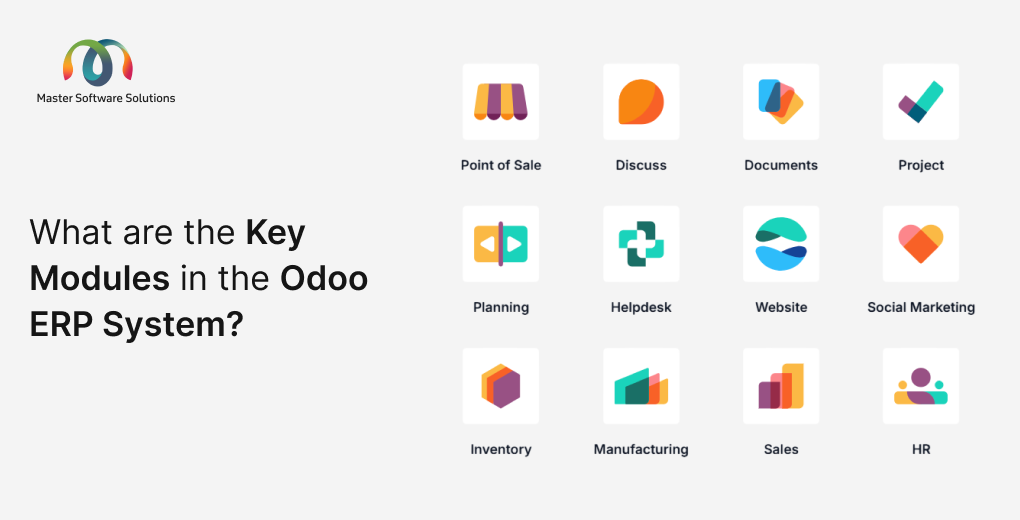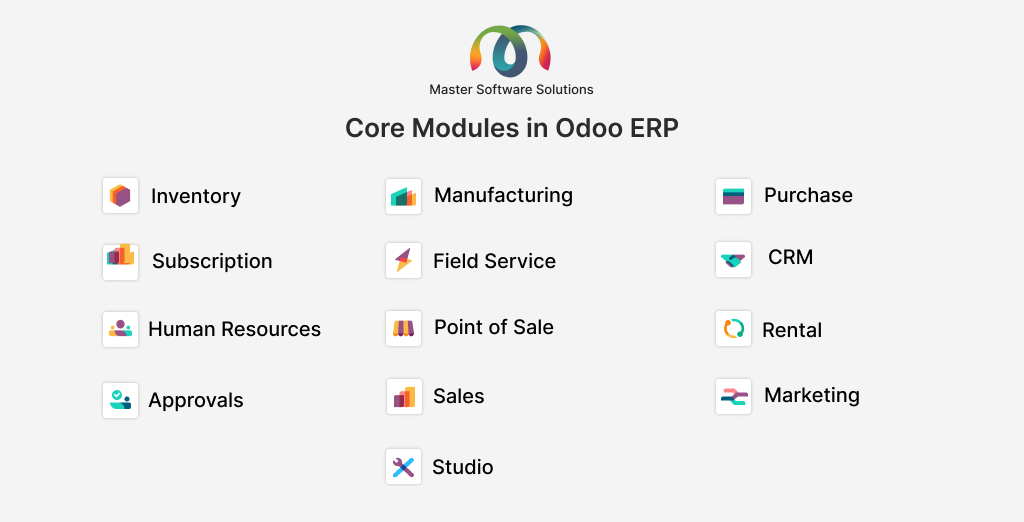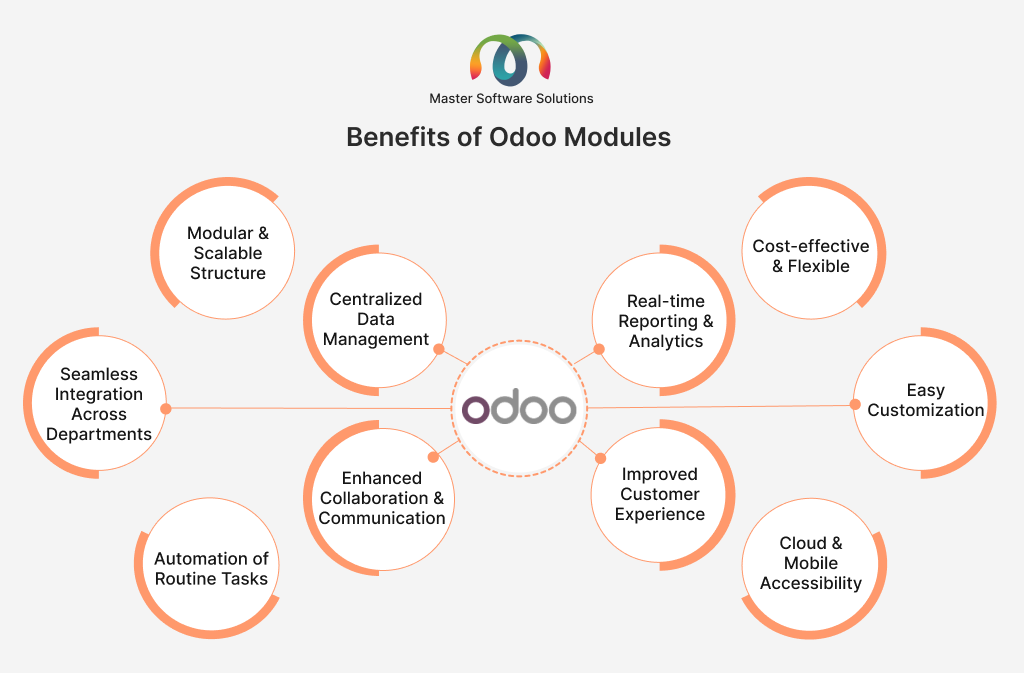Odoo ERP is a comprehensive, all-in-one business management platform that connects every department, from sales and accounting to inventory and HR, within a single, unified system. The system is designed with modular flexibility, which allows businesses to start small and expand as they grow.
This blog examines the key modules in the Odoo ERP and their contributions to streamlining operations, enhancing collaboration, and boosting overall productivity.
Table of Contents
What are Odoo modules?
Odoo modules are individual functional components or applications within the Odoo ERP system that manage specific business operations. Each module focuses on a particular area, such as Sales, Accounting, Inventory, HR, or Manufacturing, and works seamlessly with others to create an integrated business management environment.
Odoo modules are like building blocks that allow you to tailor your ERP system to your company’s specific needs, allowing businesses to add, remove, or modify functionalities as they grow.
Core modules in Odoo ERP
The Odoo ERP software offers a range of core modules that streamline key business functions, ensuring smooth collaboration across departments. Each module is designed to handle specific operations while seamlessly integrating with others to create a unified business management ecosystem. Here are the core modules in Odoo ERP:
Inventory
The Inventory module in Odoo provides end-to-end control over stock management. It enables real-time tracking of product movement across multiple warehouses, supports advanced routing (such as drop shipping and cross-docking), and automates reordering rules. The system also supports barcode integration and detailed reporting, which helps to optimize inventory levels, reduce stockouts, and increase warehouse efficiency.
Manufacturing
The Manufacturing module helps manage production processes efficiently, from planning to execution. It supports Bills of Materials (BoMs), work orders, and production scheduling, ensuring accurate tracking of materials and resources. The module integrates with other modules, including Quality, Maintenance, and Inventory, to maintain product quality and streamline the manufacturing workflow.
Purchase
Odoo’s Purchase module automates the entire purchase cycle, simplifying the procurement process. It allows users to manage supplier information, send RFQs (Requests for Quotations), compare vendor offers, and generate purchase orders. You can integrate the Purchase modules with the Inventory and Accounting modules to get complete visibility into the supply chain costs and vendor performance.
Subscription
The Subscription module is designed for businesses offering recurring products or services. It automates subscription, renewal, invoicing, and payment tracking. The system provides insights into customer subscription cycles and revenue forecasting, reducing churn rates.
Field Service
With the Field Service module, businesses can schedule, assign, and monitor field operators in real time. Field technicians can access work orders, record time spent, and capture customer signatures on mobile devices. This ensures transparency, timely service delivery, and better coordination between field teams and the back office.
CRM (Customer Relationship Management)
Odoo’s CRM module enables businesses to manage leads, opportunities, and customer interactions effectively. It tracks every stage of the sales pipeline, automates follow-ups, and provides insights into conversion rates and customer engagement. To get a 360-degree view of your customers, integrate the CRM module with the Sales, Email Marketing, and Helpdesk modules.
Human Resources (HR)
The Human Resources module streamlines HR activities, like employee onboarding, attendance, leave management, payroll, and appraisals. It centralizes employee data and automates repetitive tasks, enabling HR teams to focus on strategic activities such as talent management and employee engagement.
Point of Sale (POS)
The POS module offers a fast, intuitive, and fully integrated solution for retail and restaurant operations. It works both online and offline, synchronizing sales with Inventory and Accounting. It offers features like customer loyalty programs, multiple payment options, and receipt printing, making it ideal for customer-facing environments.
Rentals
The Rentals module simplifies asset or equipment rental management. It helps track rental orders, availability, delivery, returns, and invoicing. Integrations with Inventory ensure accurate stock status, while Accounting integrations automate revenue recognition and reporting.
Approvals
Odoo’s Approval module enhances operational control. It digitizes internal approval processes, enabling employees to submit requests for expenses, time-off, purchases, or other business activities. Traditionally, these approvals are routed through defined approval hierarchies. The Approval module eliminates manual follow-up, ensuring faster and traceable decision-making.
Sales
The Sales module manages the entire sales lifecycle, from quotations and orders to invoicing and payments. It allows teams to configure products, apply discounts, manage price lists, and automate communications. You can integrate CRM, inventory, and Accounting modules to create a seamless flow from lead to cash.
Marketing
The Marketing module empowers businesses to plan and execute multi-channel campaigns. It supports email, SMS, and social marketing, along with lead segmentation and automation tools. With analytics dashboards, businesses can measure campaign performance and customer engagement.
Studio
The Odoo Studio module enables users to customize and create applications without coding. It encourages businesses to design new models, add fields, adjust workflows, and personalize the user interface, making Odoo flexible enough to fit unique business processes without extensive development work.
Industry-specific modules in the Odoo ERP software
Odoo’s core modules cater to general business operations. The platform also offers industry-specific modules, designed to meet the unique requirements of different sectors. These specialized modules extend Odoo’s functionality, helping businesses in manufacturing, retail, healthcare, logistics, and other industries optimize their workflows and achieve greater operational efficiency. Below are some of the most widely used industry-specific Odoo modules.
Manufacturing industry
For manufacturers, Odoo provides an integrated suite of applications that enhances production planning, resource management, and quality control. These modules give manufacturers end-to-end visibility and control over their operations.
- PLM (Product Lifecycle Management): Manages product versions, engineering changes, and documentation.
- Maintenance: Monitors equipment performance and schedules preventive maintenance to avoid unexpected breakdowns and minimize downtime.
- Quality Management: Ensures products meet standards through inspection and testing checkpoints.
- MRP (Manufacturing Resource Planning): Manages production schedules, material requirements, and capacity planning and ensures seamless production.
Retail and e-commerce
Odoo supports both physical and online retail businesses with seamless, customer-focused tools, ensuring seamless operational management. The modules for retail and e-commerce integrate with backend operations, such as inventory and sales, to get a unified retail experience.
E-commerce: Builds and manages online stores with real-time inventory and order tracking.
POS (Point of Sale): Handles in-store transactions with live synchronization to accounting and inventory.
Loyalty programs: Encourage repeat customers through rewards and promotions.
Gift cards & coupons: Simplifies promotional campaigns and personalized offers.
Healthcare industry
Odoo offers healthcare modules to manage medical operations. These modules help healthcare providers enhance patient care while maintaining compliance and data accuracy.
- Patient management: centralizes patient data, medical history, and appointments.
- Laboratory management: Coordinates departments, staff schedules, and room allocations.
- Inventory for medical supplies: Tracks the availability of medicines, consumables, and equipment.
Transportation and logistics
Odoo simplifies logistics and fleet management through dedicated applications. Master Software Solutions has developed an Odoo module, “Route Planning,” that helps you plan and optimize your multi-stop delivery path, reducing turnaround time and costs. Such integrations ensure complete transparency and efficiency across transportation networks.
- Fleet management: manages vehicle details, contracts, and maintenance schedules.
- Logistics management: Optimizes routes, shipments, and delivery tracking.
- Warehouse management: Controls multi-location inventories and automates stock movements.
- Delivery management: Enhances customer satisfaction with real-time delivery updates.
Food and beverage industry
Odoo modules for the food and beverage businesses help manage perishable inventories, orders, and compliance. These modules streamline kitchen operations while ensuring quality and regulatory standards.
- Recipe management: Standardize recipes with ingredient tracking and cost tracking.
- Batch production: Enables batch processing, including product expiration and lot tracking.
- POS for restaurants: Simplifies order taking, table management, and billing.
- Quality and traceability: Ensures food safety and quality control throughout the supply chain.
Does my business need all the modules?
No. Odoo’s modular architecture allows businesses to implement only the most important modules. You can add or remove these modules based on your requirements. Odoo also allows you to pay only for the modules you use. You can start with a small one and add modules as your business grows.
Benefits of Odoo modules
Odoo’s modular architecture is one of its greatest strengths, enabling businesses to tailor the ERP system to their specific operational needs. Each module automates, integrates, and streamlines different business functions, creating a unified ecosystem that boosts efficiency, visibility, and collaboration. Below are the key benefits of using Odoo modules:
Modular and scalable structure
Odoo is designed to grow with your business. You can start with a few essential modules (like Sales, Inventory, or Accounting) and add more as your operations expand. This scalability ensures that businesses only pay for what they need and can easily adapt to future changes.
Seamless integration across departments
All Odoo modules are fully integrated, enabling automated data transfer between different departments. For example, when a sales order is confirmed, it instantly updates inventory, triggers manufacturing (if required), and generates an invoice. This eliminates data duplication and manual errors.
Centralized data management
With Odoo, all business information, from customer details to financial transactions, is stored in a single database. This unified approach ensures data consistency, enhances decision-making, and reduces the risk of data silos.
Automation of routine tasks
Odoo modules automate repetitive business processes, such as invoicing, payroll, approvals, and inventory reordering. Automation not only saves time but also minimizes human errors and improves overall productivity.
Enhanced collaboration and communication
Since every department works on the same platform, collaboration becomes effortless. Employees can access shared data, track project progress, and communicate effectively to ensure faster responses and better teamwork.
Real-time reporting and analytics
Each mobile in Odoo comes with built-in dashboards and reporting tools. Businesses can monitor performance metrics, track KPIs, and make data-driven decisions using real-time insights across sales, finance, operations, and more.
Cost-effective and flexible
Odoo’s open-source nature and modular pricing make it highly affordable compared to traditional ERP systems. Businesses can customize modules to fit specific needs without heavy development costs, ensuring maximum value at a lower total cost of ownership.
Improved customer experience
Modules like CRM, Sales, and Marketing ensure that customer interactions are well tracked and personalized. Odoo helps businesses build stronger relationships and enhance customer satisfaction.
Easy customization
Oddo offers tools like Studio, which enables businesses to customize modules, create new fields, or modify workflows without extensive coding. This flexibility allows Odoo to fit any industry or unique business process.
Cloud and mobile accessibility
Odoo modules are accessible from anywhere, at any time, via cloud deployment and mobile apps. This ensures teams can manage operations, approve requests, or monitor performance even on the go.
Implement Odoo modules into your business: Master Software Solutions
Master Software Solutions is a leading Odoo implementation company that offers all-in-one services, including consulting, configuration, migration, customization, module development, and support and maintenance services. We are certified Odoo partners and have developed multiple Odoo modules and plugins to enhance Odoo functionalities. If you are a business looking for an Odoo implementation partner to implement Odoo, contact us.


